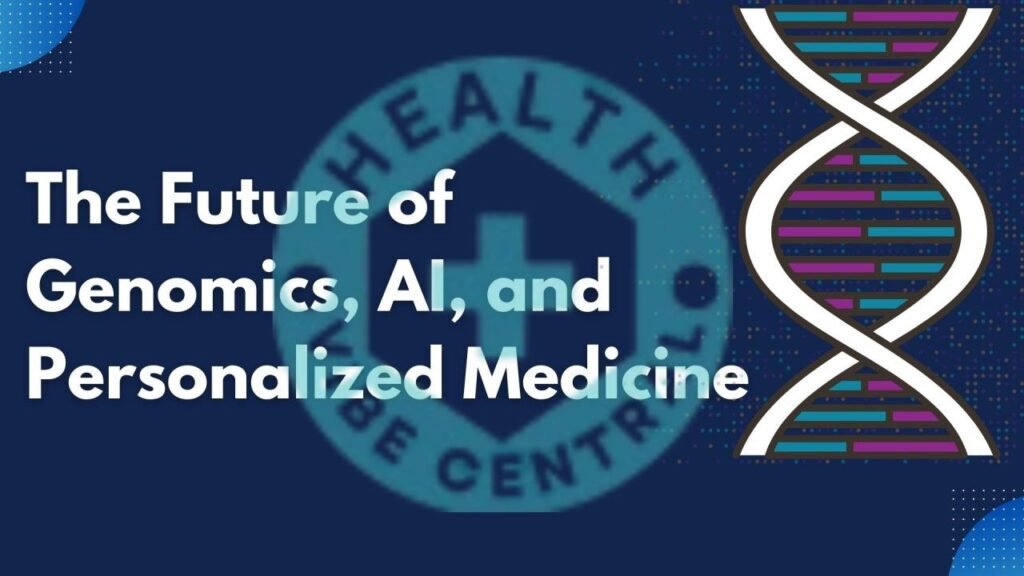
Genomic medicine refers to a relatively new field of medicine where treatment and disease prevention programs are based on an individual’s unique genetic code. It has the potential of revolutionizing disease diagnosis, treatment and maintaining health.
Understanding the sequences of an individual’s DNA, genomic medicine helps doctors, for example, to find individual approaches, which means that patients diagnosed with genetic disorders or other difficult diseases may have a hope for the improved treatment.
In this article, the author aims to propose the definition of genomic medicine, to describe its key enabling technologies, its applications in healthcare, the advantages and the disadvantages and potential trends in development of such medical fields.
What is Genomic Medicine?
Organizations employ genomic data in the clinical setting to make decisions regarding individual patient medical interventions under the umbrella of genomic medicine. All life beings possess the genome as their complete genetic structure that controls growth and functioning in addition to directing evolutionary processes and contributing to reproductive abilities.
Geneticists who analyze genome constituents seek causal genes linked to medical diseases and drug-response elements for patients.
The Role of Genetic Testing in Genomic Medicine
Genetic testing represents an essential element of genomic medicine because it uses DNA analysis to detect modifications and DNA patterns that raise disease risk for individuals. Genetic tests are extensively used procedures for identifying patient risk of developing various health problems including cancer along with heart disease and diabetes.
The BRCA1 and BRCA2 gene mutations enhance breast and ovarian cancer risks leading affected individuals to evaluate preventive strategies such as increased medical screening and surgical procedures..
Pharmacogenomics: Tailoring Drug Therapies to Genetics
Genetic testing performed through DNA examination serves as an essential aspect of modern medical genomic approaches because it screens both pathogenic genes and their genetic alterations. Popular tests exist which help identify early disease risks including cancer together with heart diseases and diabetes and other conditions.
People with genetic defects in BRCA1 and BRCA 2k genes choose preventive surgeries together with early detection treatments because these abnormalities lead to higher chances of breast and ovarian cancer.
Gene Therapy: Repairing Genetic Defects
Gene therapy stands as an exciting subfield of genomic medicine since it involves fixing damaged genes and exchanging unhealthy genes to prevent or cure diseases. The therapy will most likely treat inherited genetic diseases that include cystic fibrosis alongside sickle cell anemia and muscular dystrophy.
Through enhanced methods such as CRISPR-Cas9 the human genome can be adjusted to create opportunities for treating diseases that have no known cures. As a recently developed discipline gene therapy demonstrates great potential to transform the treatment strategies for multiple genetic disorders that mainly need symptom management since they cannot be cured.
Benefits of Genomic Medicine
The advantages of genomic medicine extend across various areas of healthcare, offering personalized approaches that can significantly improve patient outcomes.
1. Early Disease Detection and Prevention
The identification of gene mutations that lead to disease-prone conditions occurs despite the absence of illness symptoms through genomic medicine approaches. With genomic information health care providers obtain the ability to conduct early disease prevention through standard cancer screenings and dietary adjustments for preventing heart diseases. People with the defective APOE gene show increased vulnerability to develop Alzheimer’s disease.
The identification of this risk at an early stage allows necessary preventive actions to stop the person from developing Laugh type dementia.
2. Personalized Treatment Plans
The individualization of treatments is one of the main capabilities of genomics working at the population level. This way, patients get the therapies they need most relevant to their DNA and there is less guess work with treatments by the doctor. For example, in cancer treatment, doctors can determine genes causing the formation of tumors and then recommend treatments that are most effective for their patients.
3. Reduced Side Effects and Adverse Drug Reactions
Pharmacogenomics has one main advantage that has gained awareness from governments around the world and it is the reduction of ADRs. Those patients with genetic differences may develop toxic effects or are less responsive to certain therapeutic agents at standard dosages. Through genetic information about a patient, physicians adjust drug prescriptions and decrease adverse effects as well as increase drug effectiveness.
For example, those who have mutations in the TPMT gene will experience serious toxicity while having treatment of thiopurine agents, which are administered for the treatment of autoimmune diseases and leukemia. To avoid the above complications, genetic testing can help in tuning of the dosage.
4. Informed Family Planning and Reproductive Decisions
Genomic medicine is also useful in family planning as it provides consultancy and tests to intending parents. Infertility patients with a family history of certain genetic diseases, such as cystic fibrosis or Tay-sachs, can have carrier testing to see if they are at risk for passing these diseases to their offspring.
This information helps in making better decisions regarding childbearing in relation to family planning, and occasionally genetics will determine that, through prenatal action or pre-implantation genetic diagnosis, embryos should not be implanted as they are susceptible to specific genetic disorders.
Ethical Considerations in Genomic Medicine

1. Privacy and Data Security
Genomic medicine raises a primary problem concerning genetic information protection. The genetic information constitutes valuable information which could lead to severe outcomes including unfair work termination or insurance policy denials when misused inappropriately. Health-care practitioners must follow established rules to protect sensitive genetic information because such information requires mandatory protection
2. Genetic Discrimination
The other ethical issue is genetic profiling, where some individuals can be prevented from accessing health insurance or employment opportunities if they are identified to have certain genetic disorders. In some of the countries like United States for instance, this kind of discrimination is covered under the Genetic Information Nondiscrimination Act (GINA) though the risk persists especially where large sections of population are inclined to undergo tests for genomic)
Some of these legislation include the Genetic Information Nondiscrimination Act in the United States among others despite this the risk of discrimination persists as more and more people opt for genomic testing.
3. Informed Consent
This issue is critical and it also concerns the question of informed consent, mainly due to the complexity of genetic data. Patients have to be aware of possible consequences of receiving certain genetic information as well as psychological prognosis of symptoms that may occur after genotyping. It is now mandatory that healthcare providers pay adequate concern to the overall information and support which is provided to the patients taking the tests.
4. Equity and Access to Genomic Medicine
The price of genetic testing and treatment, including specialized ones, thereby is still an issue preventing many people from seeking care, especially in less privileged neighborhoods. The last operational challenge is to guarantee fair implementation of genomic medicine, which means that differences in patients’ access to care, costs of such healthcare, and their understanding of benefits of genomics must be eliminated.
The Future of Genomic Medicine

The emergence of genomic medicine shows great promise through existing rapid technological advancements and new applications development. Several new genomic medicine developments will define the upcoming generation of genomic medicine applications.
1. Integration of Artificial Intelligence (AI)
AI systems and machine learning methods play an essential role to process large genomic data collections. Machine learning provides essential tools for investigating gene variations together with their disease relations that typically exceed human capability to detect independently. AI provides improvements to both genomic medicine and prevalence medicine through expanded discovery of new therapeutic points.
2. Expansion of Direct-to-Consumer Genetic Testing
The global genetic testing industry has grown beyond popular home genetic tests delivered by 23andMe and AncestryDNA. Three kinds of genetic tests exist to uncover ancestral heritage through ancestry testing and risks and carriers for inherited conditions through their examination results. The growing trend of DTC genetic testing creates three main problems related to questionable test results integrity and privacy breaches and insufficient interpretation of data when patients lack medical professional guidance.
3. Advances in Gene Editing Technologies
The emergence of new approaches using gene-editing as the CRISPR-Cas9 system has underpinned further intervention chances of genetically inherited conditions. CRISPR enables researchers to either delete or substitute defective genes; some diseases that could be treated through gene editing include sickle cell anemia, hemophilia as well as some forms of cancer. With time, gene editing techniques could become integrated into a patient’s genome, leading to a brand new genomic cure for heretofore untreatable genetic diseases.
4. Personalized Vaccines and Immunotherapy
Genomic medicine is again the key to the next aspirational development in cancer treatment – personal vaccines and immunotherapies. First it is significant to understand the genome of a particular patient and the genome of the virus to develop vaccines and treatments on the premise of the patient’s immune system. Such strategy is already employed in cancer therapy where immunotherapies are developed depending on particular tumor antigens.
Conclusion
Genomic medicine is a newly emerging field in medicine and is characterized by personalized, precise, and targeted interventions that depend on an individual’s genotype. This approach holds immense possibilities for working in the field of diagnostics; in the treatment, as well as prevention of different diseases.
Based on the current trends and development in the field of genomic medicine, the role that is portrayed can be argued as the main focus of the future healthcare system all over the world. For distant early detection and individualized therapy or for the global issues involving genetic data confidentiality, some of the opportunities of genomic medicine to the following sophisticated future of individualized healthcare systems are huge however some of the issues